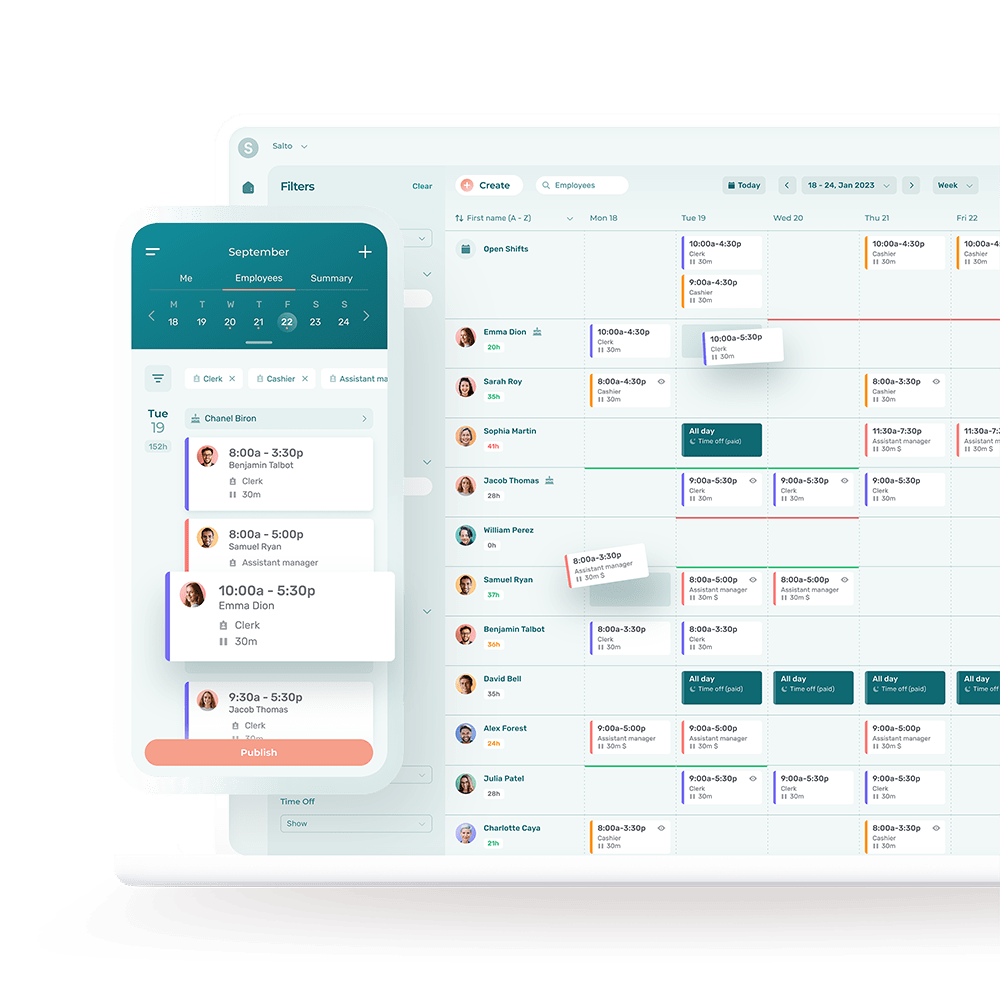Finding the best candidates for a retirement home is crucial to maintaining operations, providing quality service, and ensuring the health and safety of residents.
To find the best employees, it’s essential to ask the right questions—those that will help you quickly identify candidates that are both highly skilled and motivated. Great questions also ensure that their profile fits in with the rest of the team.
Here are the best questions to ask candidates, depending on the position they’re applying for in your retirement home, as well as a number of tips and tricks to help you improve the way you do things.
19 Retirement Home Interview Questions, Divided by Role
This section goes over some of the questions to ask based on the candidate’s job. More specifically, we’ll be looking at the following:
- Beneficiary attendants
- Nurses
- Receptionists
- Food service attendants
- General questions
- Illegal questions
Some questions are generic while others are more specific. This is necessary to determine whether the applicant has the right profile, skills, and qualities to successfully fill the position.
Without further ado, here are some question examples to ask candidates as well as what you should look out for in their answers.
Interview Questions for Beneficiary Attendants
1. What do you like the most about being an attendant?
- Why ask this question: to find out more about the candidate’s motivation and work ethic.
- What to look out for: honesty in the candidate’s response, with a particular focus on the quality of care offered.
2. How do you handle stressful situations?
- Why ask this question: to understand how the candidate reacts to stress and to ensure that this fits in with the processes in place and the working methods of the rest of the team.
- What to look out for: the candidate’s reflexes in stressful situations and their ability to make the right decisions and ask for help when needed.
3. You are informed at the last minute that one of your colleagues can’t make it to work today. How do you react?
- Why ask this question: to assess the candidate’s ability to find solutions and adapt without compromising care.
- What to look out for: a proactive attitude and the ability to adapt to the unexpected.
4. If a client refuses to cooperate during a routine care procedure, how do you handle the situation?
- Why ask this question: to ensure that the candidate adopts the highest ethical standards, delivers quality care even to difficult clients, and is able to maintain composure in tense situations.
- What to look out for: the ability to stay calm, find solutions, and put patients’ needs first.
Interview Questions for Nurses
5. In your opinion, what is the most difficult aspect of being a nurse?
- Why ask this question: to identify the candidate’s possible frustrations, determine whether they’ll be able to thrive in your team, and to make sure they understand the hardships they may encounter on the job.
- What to look out for: the candidate’s understanding of the difficulties that come with the job, the solutions implemented to deal with them, and the authenticity of their answers.
6. What would you do if you saw one of your colleagues acting contrary to your order’s code of ethics?
- Why ask this question: to identify whether the candidate understands their responsibilities as a healthcare professional and meets your standards.
- What to look out for: professional ethics and the importance of respecting patients’ rights.
7. Why did you decide to become a nurse?
- Why ask this question: to validate the candidate’s passion and interest, and ensure that their values are in line with others in your residence.
- What to look out for: a passion for patients’ health and well-being, open-mindedness, and professional ethics.
8. How do you manage to grow professionally in your position?
- Why ask this question: to learn more about the candidate’s motivations.
- What to look out for: interest in knowledge development, quality of care, and teamwork.
Interview Questions for Receptionists
9. The family member of a resident complains about the care they receive. How would you handle this situation?
- Why ask this question: to ensure that the candidate is able to find solutions quickly and provide excellent customer service.
- What to look out for: the ability to solve problems, remain calm under stress, act diplomatically, and ensure the satisfaction of patients and their families.
10. The phone rings while you’re interacting with a resident. What do you do?
- Why ask this question: to verify the candidate’s ability to prioritize tasks and multi-task without compromising customer service quality.
- What to look out for: the ability to prioritize tasks, find solutions, and be proactive.
11. In your opinion, what are the most important qualities to have as a receptionist in a retirement home?
- Why ask this question: to validate the candidate’s perception of the position they are applying for.
- What to look out for: qualities such as empathy, patience, open-mindedness, and respect.
12. What would you do if you noticed a resident behaving out of the ordinary?
- Why ask this question: to ensure that the candidate is proactive and puts the health and safety of residents first.
- What to look out for: the ability to find solutions, proactivity, and empathy.
Interview Questions for Food Service Attendants
13. What would you do if a resident asked you a question for which you don’t know the answer to?
- Why ask this question: to ensure that the candidate is able to find solutions independently and provide quality customer service.
- What to look out for: the candidate’s proactivity, ability to ask for help, and to work as part of a team.
14. One of your colleagues is late for work. How do you deal with the situation?
- Why ask this question: to ensure that the candidate is diplomatic, proactive, and able to take on more responsibility when necessary.
- What to look out for: patience and proactivity, as well as the ability to work as part of a team and find solutions to conflict situations.
15. Have you ever received negative feedback from a supervisor? What did you do to improve the situation?
- Why ask this question: identify the candidate’s ability to receive feedback and improve.
- What to look out for: the ability to take responsibility for one’s actions, the desire to improve, and the candidate’s capacity for introspection.
16. What’s the most important thing for you when working in a team?
- Why ask this question: to better understand how the candidate collaborates with other employees and validate the fit with the team in place.
- What to look out for: the ability to act diplomatically and to ask for or offer help when needed.
Interview Questions for Any Position in a Retirement Home
17. What’s the most important thing about your work?
- Why ask this question: to better understand employee motivations and validate that their expectations can be met within your organization.
- What to look out for: the candidate’s transparency and sincerity, and the match between their needs and what the company can offer.
18. Why are you looking for a new job?
- Why ask this question: to identify the candidate’s needs and pinpoint possible conflicts of values.
- What to look out for: the quality and transparency of the candidate’s response, as well as any negative comments made about a former employer.
19. What skills make you the ideal candidate for the position?
- Why ask this question: to better understand how the candidate perceives their strengths and identify what they could bring to your team.
- What to look out for: the candidate’s capacity for introspection and the qualities that could complement those of your team.
Questions That Are Illegal to Ask
Obviously, certain questions are prohibited because they are considered discriminatory. For example, an employer may not ask questions relating to age, gender, ethnic origin, religion, marital status, etc., which are considered discriminatory.
Here are some examples of illegal questions to ask when interviewing a candidate:
- Do you want to start a family soon?
- What is your religion?
- Where were you born?
- Do you have any disability?
- How old are you?
- Do your children go to daycare?
- Do you have a family member to support?
- Do you often have to take time off work for health reasons?
Best Practices for Successful Interviews as a Manager in a Retirement Home
The hiring process has a major influence on candidates’ experience. So, it’s crucial to be well prepared to maximize your chances of recruiting the right people to complete your team.
Here are the best practices for each stage of the hiring process.
Before the Interview
- Review the job description you’re looking to fill: to fully understand and identify the skills, qualities, and behaviors required to successfully fill the position.
- Reread the candidate’s CV: so you can ask relevant, personalized questions.
- Prepare the interview location: choose a quiet, private spot and prepare a carafe of drinking water with clean glasses.
- Personalize your questions: every candidate is different. Although several questions can be asked of each, personalizing your approach will help you identify the best candidates.
During the Interview
- Introduce yourself and the company: take the time to introduce yourself and put the candidate at ease. Don’t hesitate to give a more detailed presentation of the company, including its mission and values, as well as how it operates (working hours, clientele, employee management software used, specific operating methods, etc.).
- Ask open-ended questions as much as possible: to give candidates the opportunity to explain themselves and add nuances to their answers. Don’t hesitate to encourage candidates to share any information they didn’t have a chance to discuss during the interview with you at the end.
- Practice active listening: to put candidates at ease, demonstrate your interest and give them time to fully develop their ideas.
- Remain open-minded: set aside your prejudices and ask candidates to clarify their statements when necessary.
- Answer their questions: make sure that candidates’ questions are answered openly and honestly.
- Keep the conversation flowing: ask candidates for more details and let them ask questions in return.
- Talk salary no matter what: to avoid wasting the candidate’s time and your own.
After the Interview
- Take notes immediately afterwards: so you don’t forget your impressions and to better compare candidates later on.
- Follow up with candidates: when you interview anyone, the least you can do is follow up with them, whether or not you’ve decided to hire them. Don’t hesitate to give feedback so that they can improve. They might even apply again later when they have more experience under their belt.
- Validate the references of the most interesting candidates: take the time to check references, especially if you’re hesitating between several candidates. This will give you the additional information you need to make an informed decision.
General Hiring Tips
- Take part in job fairs: you’ll meet lots of potential candidates and get a chance to practice your social and interpersonal skills.
- Build a talent pool: to facilitate your recruitment process and keep in touch with promising candidates to whom you were unable to offer a position.
- Review your hiring process periodically: to ensure that your processes are up-to-date, efficient, and relevant to the job market. Ideally, your hiring process should be reviewed at least once a year.
- Develop your skills: take training courses to improve your own skills, ask your colleagues for advice and anonymously survey the employees you’ve hired to gather feedback and improve.
Employee Corner: 18 Interview Questions to Ask Your Future Employer
During a job interview, candidates should also be given the opportunity to ask questions of their own. This allows them not only to demonstrate their interest, but also to validate that their expectations and needs will be met if they accept the position.
Here are a few examples of questions candidates can ask their future employer:
- Can you describe the clientele of the retirement home?
- What are the most important job responsibilities for you?
- How are work schedules transmitted?
- What are the working hours like?
- What is your vacation policy?
- What’s a typical working day like?
- What do you think sets your residence apart from others?
- What kind of professional development opportunities do you offer?
- What is the management style of the person who will be my direct supervisor?
- What’s a new employee’s first day like?
- What does your employee handbook look like?
- Do you organize team-building activities?
- How do performance reviews work in the company?
- How are conflicts managed within the team?
- Can you give more details about the benefits offered?
- What do you enjoy most about working for the company?
- What qualities do you think are needed to succeed in this role?
- What is your turnover rate and why do employees stay?
A Few More Tips to Ensure the Best Interview Possible
- Keep it professional: respect regional labor laws, don’t ask questions that could lead to discrimination, be punctual.
- Be flexible: adapt to each candidate to provide a personalized experience, and offer several options for the interview time.
- Be transparent: don’t promise things you can’t deliver, talk salary quickly to validate the candidate’s expectations, and be honest in your approach.
- Be open-minded: avoid prejudice, keep in mind that no candidate is perfect, don’t fall into the trap of always hiring people with similar profiles, and encourage diversity.
Have a great interview!













